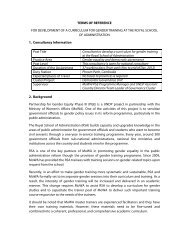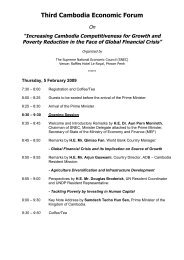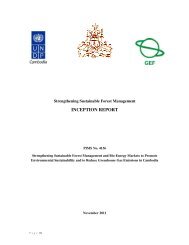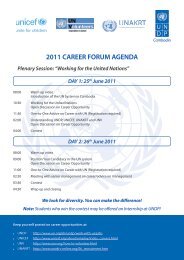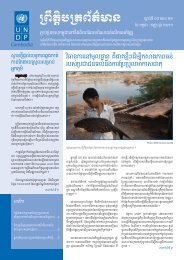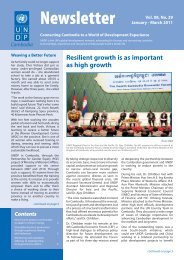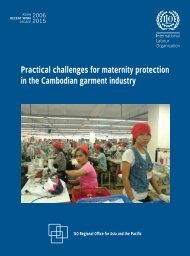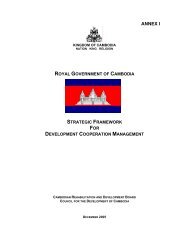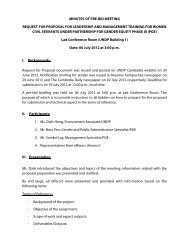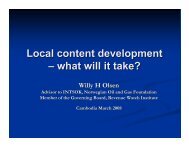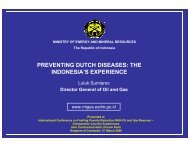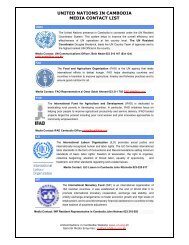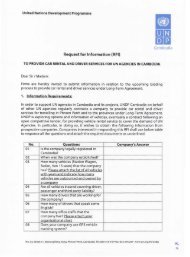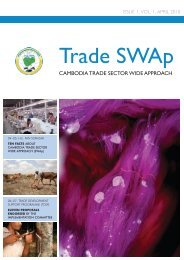UN Analysis Final.pdf - United Nations in Cambodia
UN Analysis Final.pdf - United Nations in Cambodia
UN Analysis Final.pdf - United Nations in Cambodia
You also want an ePaper? Increase the reach of your titles
YUMPU automatically turns print PDFs into web optimized ePapers that Google loves.
<strong>Cambodia</strong> also has a national policy on migration. Conta<strong>in</strong>ed <strong>in</strong> the Sub-decree 57 on Send<strong>in</strong>g Khmer Migrants<br />
to Work Abroad, this policy document provides guidel<strong>in</strong>es to recruitment agencies on how to recruit and<br />
send <strong>Cambodia</strong>ns for overseas work. Only 5 out of 22 articles, however, explicitly or implicitly refer to<br />
the worker, reflect<strong>in</strong>g broad provisions that are open to <strong>in</strong>terpretation and amount to little protection for<br />
employees (Lee, n.d.).<br />
3.2.1 GOVERNMENT MINISTRIES’ YOUTH-RELATED POLICIES AND PROGRAMMES<br />
A. M<strong>in</strong>istry of Education, Youth and Sport<br />
MoEYS takes the lead <strong>in</strong> fulfill<strong>in</strong>g the Government’s Education for All (EFA) National Plan 2003-<br />
2015 “to ensure that all <strong>Cambodia</strong>’s children, youth and adults have equitable access to<br />
formal and non-formal basic education” (MoEYS 2002). EFA has six core goals, represent<strong>in</strong>g<br />
strategies that seek to address gender and poverty-l<strong>in</strong>ked disparities, (MoEYS 2003a):<br />
Ensure that, by 2015, all children, particularly girls, children <strong>in</strong> difficult circumstances and<br />
those belong<strong>in</strong>g to ethnic m<strong>in</strong>orities, have access to and complete free and compulsory<br />
primary education of good quality.<br />
Ensure that the learn<strong>in</strong>g needs of all young people and adults are met through equitable<br />
access to appropriate learn<strong>in</strong>g and life skills programmes.<br />
Achieve a 50 per cent improvement <strong>in</strong> levels of adult literacy by 2015, especially for women,<br />
and equitable access to basic cont<strong>in</strong>u<strong>in</strong>g education for all adults.<br />
Elim<strong>in</strong>ate gender disparities <strong>in</strong> primary and secondary education by 2015, with a focus on<br />
ensur<strong>in</strong>g girls full and equal access to and achievement <strong>in</strong> basic education of good quality.<br />
Expand and improve comprehensive early childhood care and education, especially for the<br />
most vulnerable and disadvantaged children.<br />
Improve all aspects of the quality of education and ensure the excellence of all, so that<br />
recognised and measurable learn<strong>in</strong>g outcomes are achieved by all, especially <strong>in</strong> literacy,<br />
numeracy and essential life skills.<br />
MoEYS’ Education Strategic Plan (ESP) and Education Sector Support Programme (ESSP) support<br />
the implementation of the EFA. Policy objectives of the medium term ESP/ ESSP focus on assur<strong>in</strong>g<br />
equitable access to basic and post basic education; enabl<strong>in</strong>g quality and efficiency improvement; and<br />
capacity build<strong>in</strong>g for decentralisation. The ESP aims at develop<strong>in</strong>g an <strong>in</strong>clusive, easily accessible, and<br />
high quality service that is available to all, as a means of enabl<strong>in</strong>g economic growth, improved<br />
employment prospects and <strong>in</strong>come-generat<strong>in</strong>g opportunities. It also views education as necessary<br />
to realis<strong>in</strong>g improved family health and nutrition, and family plann<strong>in</strong>g. The ESSP, on the other hand<br />
prioritises programme strategies and activities focused on the long-term goal of achiev<strong>in</strong>g Education<br />
for All by 2015 (MoEYS, 2003b), particularly <strong>in</strong> reach<strong>in</strong>g equitable access to n<strong>in</strong>e years of quality basic<br />
education by 2010 and <strong>in</strong> respond<strong>in</strong>g to critical capacity build<strong>in</strong>g needs. A basic pr<strong>in</strong>ciple it adopts is<br />
that programmes are planned and implemented through governmental and m<strong>in</strong>istry systems to<br />
strengthen appropriate MoEYS directorates and departments at central and prov<strong>in</strong>cial levels.<br />
7<br />
The Labour Law passed <strong>in</strong> October 1998, ma<strong>in</strong>ly provides for a standard legal work<strong>in</strong>g week of 48 hours, not to exceed eight hours per day.<br />
It also stipulates time-and-a-half for overtime, and double time if overtime occurs at night, on Sunday, or on a holiday.<br />
The m<strong>in</strong>imum allowable age for a salaried position is set at 15 years or at 18 years for anyone engaged <strong>in</strong> work that may be hazardous,<br />
unhealthy, or unsafe.<br />
Situation <strong>Analysis</strong> of Youth <strong>in</strong> <strong>Cambodia</strong><br />
25



